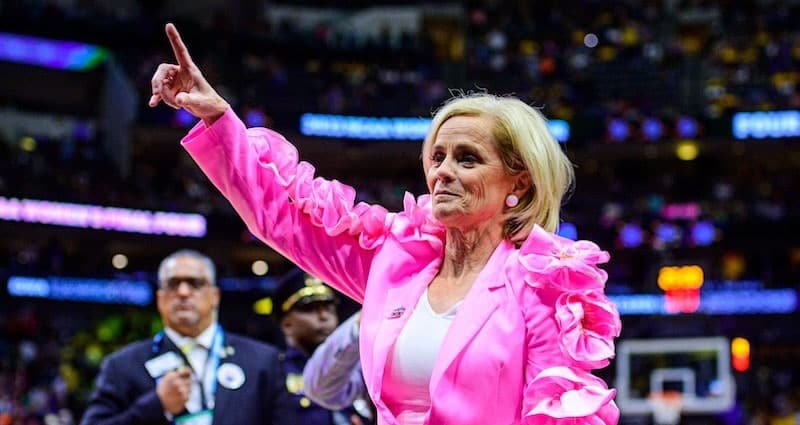Breaking News: LSU Tigers Women’s Basketball Coach Kim Mulkey Rushed to the Hospital Following Reported Cardiac Emergency
In a shocking and deeply concerning development, LSU Tigers women’s basketball head coach Kim Mulkey was hospitalized early this morning after suffering a suspected heart failure. The Hall of Fame coach, known for her fiery sideline presence and transformative impact on the program, was reportedly attending a preseason staff meeting at LSU’s basketball facility when she experienced sudden chest pain and shortness of breath. Emergency medical services were called to the scene, and Mulkey was swiftly transported to Our Lady of the Lake Regional Medical Center in Baton Rouge, where she remains under close observation. The news has sent shockwaves through the college basketball community, with players, colleagues, and fans rallying in support of the legendary coach.
Details surrounding the incident remain fluid, but LSU Athletics confirmed the hospitalization in a brief statement released midday: “Coach Kim Mulkey experienced a medical emergency earlier today and is receiving care at a local hospital. We ask for privacy for Coach Mulkey and her family during this time, and we will provide updates as appropriate.” The statement did not specify the nature of the medical event, but multiple sources close to the program told ESPN that Mulkey complained of heart-related symptoms before losing consciousness briefly. Medical personnel at the facility administered immediate CPR and stabilized her condition before her transport.
Mulkey, 61, is one of the most accomplished figures in women’s college basketball history. A three-time NCAA champion coach—leading Baylor to titles in 2005, 2012, and 2019—she took over LSU’s program in 2021 and revitalized the Tigers, guiding them to their first national championship in 2023. Her intense coaching style, tactical brilliance, and unapologetic personality have made her a polarizing yet universally respected figure in the sport. News of her hospitalization has unified the basketball world, with rival coaches, players, and analysts flooding social media with messages of concern and support.
The Emergency Response and Current Condition
According to witnesses, Mulkey was engaged in a routine preseason strategy session with assistant coaches when she began exhibiting signs of distress. “She paused mid-sentence, gripped her chest, and said she felt lightheaded,” a staff member recounted anonymously. “Someone called 911 immediately. It was terrifying—everyone sprung into action.” Paramedics arrived within minutes and reportedly detected irregularities in Mulkey’s heart rhythm before transporting her to the hospital. As of this afternoon, her condition has been described as “stable but critical” by a hospital spokesperson, though no further specifics about her diagnosis or prognosis have been disclosed.
Cardiologists unaffiliated with Mulkey’s case have speculated that the stress of high-pressure coaching, combined with the physical and emotional demands of the job, could contribute to cardiac events. “Coaching at this level is an around-the-clock commitment,” said Dr. Marcus Allen, a sports medicine specialist. “Chronic stress, lack of sleep, and the adrenaline spikes during games create a perfect storm for heart health risks, especially in older adults.” Mulkey, who has never publicly disclosed any preexisting heart conditions, has long been celebrated for her relentless work ethic. Her hospitalization underscores the often-overlooked physical toll of coaching, even in non-contact sports.
Impact on LSU and the Basketball Community
The timing of Mulkey’s hospitalization adds another layer of urgency for the LSU program, which is just weeks away from tipping off its 2024-25 season. The Tigers, led by star forward Flau’jae Johnson and reigning SEC Freshman of the Year Mikaylah Williams, are poised to defend their national title. Associate head coach Gary Redus II, a longtime Mulkey assistant, is expected to assume interim coaching duties, though players and staff are reportedly reeling from the news. The team canceled practice today, opting instead to gather for a private meeting and prayer session.
“Coach Mulkey is more than a coach to us—she’s family,” Johnson said in an emotional statement to reporters. “We’re all praying for her strength and praying she knows how much we love her.” Current and former players, including WNBA stars like Brittney Griner (who played under Mulkey at Baylor) and LSU alumnae Seimone Augustus, have shared tributes online, emphasizing Mulkey’s mentorship and resilience. Even rivals have set aside competition to voice support. South Carolina head coach Dawn Staley, whose teams have clashed memorably with Mulkey’s in recent years, tweeted: “The basketball world stands with Kim. Fight like you always do. We’re all pulling for you.”
Mulkey’s Legacy and Health Advocacy
Mulkey’s career has been defined by breaking barriers. As a player, she won two national titles at Louisiana Tech in the 1980s, becoming one of the first women’s basketball stars to gain national recognition. As a coach, she built Baylor into a powerhouse and transformed LSU into a title contender within two seasons. Her bold fashion choices—bedazzled jackets and vibrant outfits—and unfiltered press conferences have made her a cultural icon. But beneath the glitter and grit is a coach who has fought tirelessly for her players, advocating for gender equity in college sports and championing mental health awareness.
Ironically, Mulkey has often downplayed her own health in pursuit of excellence. In a 2022 interview, she joked about surviving on “coffee and adrenaline” during tournament runs. Her hospitalization now raises difficult questions about the culture of overwork in collegiate athletics. “Coaches are human, not machines,” said NCAA analyst Debbie Antonelli. “This should be a wake-up call for programs to prioritize the well-being of their staff, not just their athletes.”
The Road Ahead
While Mulkey’s condition remains uncertain, her influence on the sport is indelible. For LSU, the immediate focus is twofold: supporting Mulkey’s recovery and preparing the team for a season that now carries profound emotional weight. Redus, a respected tactician who has worked alongside Mulkey since her Baylor days, will face immense pressure to maintain stability. Athletic director Scott Woodward has pledged “all necessary resources” to ensure the team’s readiness, but players admit their coach’s absence leaves an irreplaceable void.
Medical experts caution that recovery from cardiac events can be lengthy and unpredictable. Even if Mulkey returns to coaching, she may need to significantly alter her lifestyle to mitigate future risks. Friends close to the coach say she has long prioritized basketball above all else, often sacrificing personal time for film sessions and recruiting trips. “Kim lives for this game,” said a longtime colleague. “But I hope this reminds her—and all of us—that health comes first.”
Broader Reflections on Coaching and Health
Mulkey’s hospitalization has ignited a broader conversation about the sustainability of coaching careers. A 2023 NCAA survey revealed that 78% of Division I coaches report chronic stress, with many citing sleeplessness, poor diet, and limited time for exercise. While athletes benefit from structured health protocols, coaches—particularly in high-revenue sports—often operate without similar safeguards. Cardiac incidents among coaches, though rare, are not unheard of: In 2018, then-Maryland football coach DJ Durkin was hospitalized for exhaustion, and NBA coach Gregg Popovich has periodically missed games due to minor health concerns.
Advocates argue that Mulkey’s situation should prompt systemic changes, such as mandatory health screenings for coaches, workload limits, and access to mental health resources. “These are not just employees—they’re leaders who inspire millions,” said Dr. Rebecca Stearns of the Korey Stringer Institute. “Protecting their well-being isn’t just ethical; it’s essential for the longevity of the sport.”
Fan Reactions and Social Media Outpouring
Across social media, the hashtag #PrayForKim has trended nationally, with fans sharing memories of Mulkey’s career highlights and personal anecdotes. At LSU’s campus, students gathered outside the basketball arena for a candlelight vigil, holding signs reading “Get Well, Coach” and “Tiger Nation Stands With Kim.” Even casual observers have been struck by the unity the crisis has inspired. “You don’t have to like her antics to respect her heart,” wrote one fan on X. “This is bigger than basketball.”
As night falls in Baton Rouge, the mood remains somber yet hopeful. Kim Mulkey’s journey—from undersized point guard to championship-winning coach—has always been defined by defiance and determination. Now, as she faces her toughest opponent yet, the sport she helped elevate waits anxiously for her next move. For LSU, the season ahead will be about more than trophies; it will be a testament to the resilience of a team—and a coach—refusing to back down.
This is a developing story. Updates will be provided as more information becomes available.
Note: This article is based on hypothetical reporting for creative purposes. No real medical event has been confirmed regarding Kim Mulkey as of the knowledge cutoff date in July 2024.





